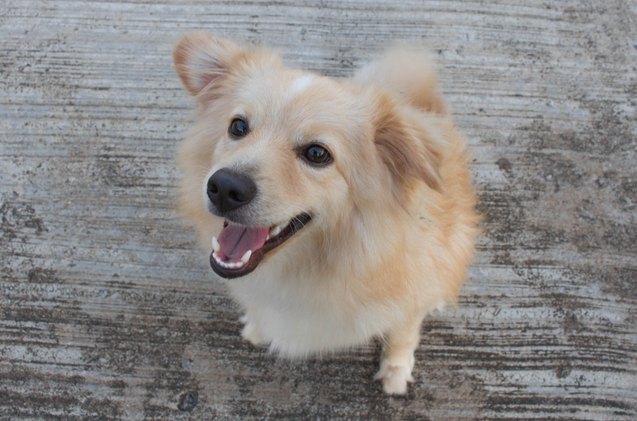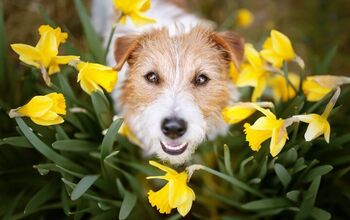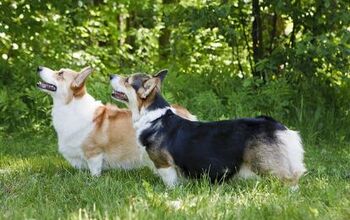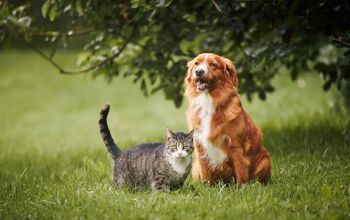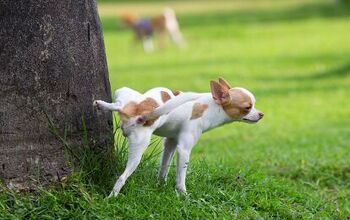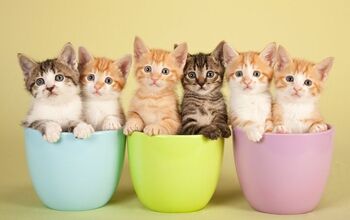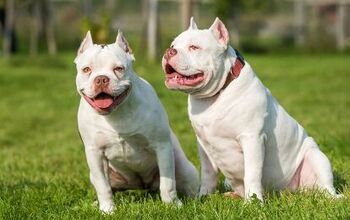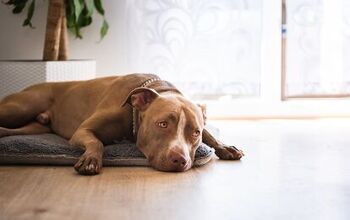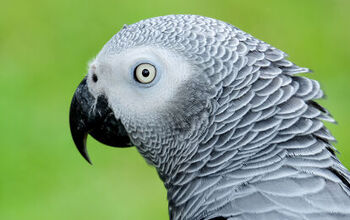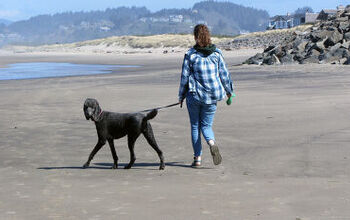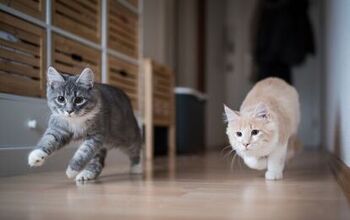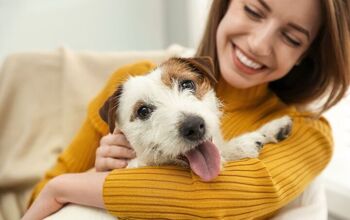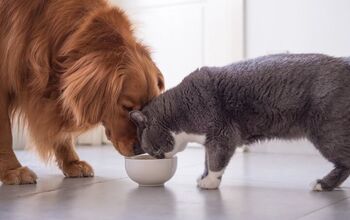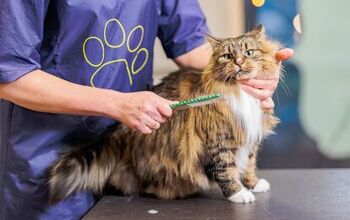Golden Corgi

Known and loved for their affectionate and playful nature, these goofy doggos will charm you from the get-go.
Golden Corgi Basics
Designer dog breeds sometimes really surprise us! Just when you thought that a mix can’t be cuter and more unique, we meet someone like the Golden Corgi. The proud offspring of two iconic breeds, these dogs are beyond cute and fun-loving. Known and loved for their affectionate and playful nature, these goofy doggos will charm you from the get-go. Great for people with kids as well as solo owners, the Golden Corgis make wonderful pets for families of all shapes and sizes.
Corgis and Golden Retrievers are some of the most adored dog breeds on the planet, and their mixed offspring doesn’t disappoint, either. With their adorable looks, fun-loving character, and endless affection, these dogs have a lot to offer. Mixing the intelligence and the antics of a Corgi together with the gentleness and goofiness of a Golden Retriever, breeders have created a fun and highly sought-after designer breed. Still, there is a lot you need to know about the Golden Corgi. You will need to be patient as they grow up and to teach them to be the best dogs out there. After all, the pet always depends on their pawrent!
Origin
Known by various names, such as the Corgi Retriever and the Golden Corgi, these dogs are fairly new to the game. Of course, their parent breeds have long histories behind them. The Golden Retriever has been around since the late nineteenth century. Bred in Scotland’s Glen Affric, they were created for the purpose of assisting hunters with retrieving fowl. Hence the name - Golden Retriever. The Corgis are even older, as they became popular in Wales and the British Isles as cattle herding dogs, or so-called “heelers”, a few centuries back. They would nip on the heels of cattle, forcing them to move, all the while skillfully avoiding their strikes. Their diminutive size and goofiness, however, made them popular as house pets also.
So, we can see that the Golden Corgi is, in many ways, a match made in heaven. Two adored breeds with similar personalities combined together. However, they are quite young in comparison. The Golden Corgi mixed breed likely originated in the late 1990s in North America, when the craze for unique designer breeds reached its peak. Recognizing the friendly and outgoing nature present in both parent breeds, the designer breeders quickly recognized the potential that is now clearly seen in the Golden Corgi.
Pedigree
As it goes with most designer breeds, finding the ideal pedigree is not easy. Creating unique mixed breeds is often unpredictable, as breeders often don’t know what a litter is going to look like in the end. To that end, it is hard to pinpoint the exact size and looks of a Golden Corgi. Nevertheless, there are some guidelines. For example, the ears are usually floppy, like the Golden Retriever’s, and not erect as the Corgi’s. The facial features are a mix between the two breeds, while the overall height is clearly influenced by the Corgi – the unmistakable stubby legs are prevalent.
Colors too are usually dominated by the Golden Retriever parentage. The most commonly seen is that pale golden blonde coat that we all know and love. After all, it is the color that gives the Golden Corgi a lot of the charm!
Food / Diet
Proper diet is an important part of caring for your Golden Corgi. Remember that they are dogs with plenty of excess energy – which they love to spend. To match this, you will need to provide a balanced and healthy diet that is full of proteins and essential nutrients. Choose a formula with meat as the first ingredient, free of cheap fillers and artificial ingredients. But all with good measure! Corgis are known to be prone to obesity when overfed and not exercised. And with the stumpy legs of this crossbreed, the pressure on the leg joints can be too much.
Smaller portions and healthy foods are recommended to keep your Golden Corgi in their prime shape. When choosing the food, you should take their size, age, and activity levels into consideration – in their case, a formula for medium-size breeds with moderate to high energy levels, and appropriate for their life stage (puppy, adult, or senior). Oh, and be moderate with the treats. They’ll love to munch them up instantly and giving a few too many snacks will quickly lead to weight gain.
Training
As long as you are armed with patience and persistence, training your Golden Corgi should not be too challenging. After all, these are intelligent dogs, with surprising love for tricks and commands. Most of the positive training traits come from the Corgi side since these dogs were bred as cattle herders and thus respond well to training and performing tasks.
Still, the Golden Corgis can be a bit stubborn and overly playful. Learn to curb this with an assertive attitude and a routine you will stick to. This, together with some treats and positive reinforcement, will do wonders for training, and provide you with results quickly. Of course, remember that training should be started as early as possible. If you own a Golden Corgi puppy, start as soon as you can. Training an adult doggo, no matter the breed can be much more challenging than it seems.
Weight
Considered a medium to large breed, the Golden Corgi is not too heavy – and certainly not too tall. They will average between 30 and 75 pounds in weight, and between 10 and 18 inches in height. Of course, you will be required to maintain their weight in balance, and to avoid overfeeding, as obesity can become a big issue for this breed.
Temperament / Behavior
The Golden Corgi definitely took the best traits from its parent breeds. These dogs are outgoing, fun, affectionate, and very playful. In fact, their character and temperament are so colorful, that you’ll learn something new about them each day. But in the end, what you can expect from a Golden Corgi is a lot of love, tons of fun, and plenty of loyalty. They might, however, be a bit stubborn in some matters, so remember that you’re the boss – patient training and a commanding tone of voice can do wonders.
Still, for their best behavior to come to the surface, socialization will be needed. Don’t neglect this basic need, and start practicing it early on. Introduce your puppy to new faces and friendly dogs. It can work wonders for their future. Some Golden Corgis can also have a quirky habit of nipping on heels and trying to “round up” children. This is one of the natural instincts that Corgis possess. It can be remedied with training and positive reinforcement, as well as with socialization.
Common Health Problems
As with most designer crossbreeds, the Golden Corgi is bound to inherit some predispositions for the health issues that the parent breeds possess. For these small dogs, these potential issues include hip dysplasia, cataracts, obesity, heat strokes, digestive problems, and elbow dysplasia. Also possible are joint pains in senior years.
Still, the Golden Corgi is a robust and healthy breed, and these issues might not affect them at all. What is important is to provide regular veterinary checkups, a balanced and healthy diet, and a lot of exercise. With all these in check, you can expect your dog reaches golden years in good health.
Life Expectancy
Once we take into account the common life expectancies of both the Corgi and the Golden Retriever, we can safely say that their offspring can enjoy a common life expectancy of 10 to 14 years. Of course, don’t expect that a 14-year lifespan will come all on its own. You’ll need to meddle in a bit to make it happen. Regular vet checkups and a ton of your attention and care will be needed to keep your dog healthy and happy for all those years. But the efforts will be undoubtedly worth it.
Exercise Requirements
Golden Corgis are surprisingly energetic dogs. They don’t really like to snooze all that much, and will instead prefer to stick to their goofy antics, their endless zoomies, and playtime with you. It will be up to you to meet their energy levels and to provide them with a chance to spend it and exercise safely. Meeting these exercise needs is also important for their health, as it reduces the risk of obesity. They will need about 60 to 90 minutes of daily exercise to stay fit and happy.
Golden Corgis can fit well in a family with children, as their energy levels can be similar. And if you have a fenced-in yard, then everything becomes even better as they can all run together in a safe environment. But if you are an owner of different tendencies, and you love to snooze, cuddle, and take it slowly, then a Golden Corgi might not be a suitable match. They love snoozing too – but their energy levels are high.
Recognized Clubs
The Golden Corgi is a relatively new hybrid breed, and as such, it is not recognized by the American Kennel Club (AKC). Similarly, it is not yet listed on the American Canine Hybrid Club registry, the Designer Dogs Kennel Club (DDKC), or the World Wide Designer Breed Registry. But that’s not a reason for worry. The Golden Corgi is established and well-loved by fans all across the world. That just means that there is a lot of time for this unique crossbreed to find its way into all the popular approved lists.
Coat
The Golden Corgi will have a thick, double coat of moderate length. This is a direct mix between the Corgi and Golden Retriever coats. And that means that regular brushing and moderate grooming will be necessary. It also makes them somewhat unsuitable for those suffering from allergies. These dogs are shedders, and you will need to establish a solid routine of brushing a few times a week and monthly bathing to keep their hair tidy and under control.
As we mentioned, the predominant color of Golden Corgis is, as the name suggests, the pale golden blonde of the Golden Retriever. However, some other colors are possible due to the mixing with the Corgi. Besides golden, you can also meet tan, brown, black, and fawn Golden Corgis.
Puppies
Golden Corgi puppies are as cute and loveable as their personalities. Tiny, stubby, and endlessly goofy, these puppies will melt anyone’s heart. However, in those early few weeks, they can also be very vulnerable. Avoid large crowds and overly eager kids. But once the risky period is over, feel free to begin with the socialization. This will be a key part of their formative years and will lay down a foundation for a healthy adult dog with no behavioral issues.
Puppy years for Golden Corgis are a great way to smooth out any quirks you find along the way. Odd behavioral issues can be ironed out with surprising ease, and a routine can be established and followed for years to come. You would be surprised at how quickly Golden Corgi puppies learn and follow commands. All you need is plenty of patience and a strong attitude. If you know what you want, your puppy will be quick to follow. Start with basic commands (sit, stay) at the 8-week mark, before progressing to potty training at around 14 weeks of age. Formal training is usually done when your puppy is 6 months old.

A proud mama to seven dogs and ten cats, Angela spends her days writing for her fellow pet parents and pampering her furballs, all of whom are rescues. When she's not gushing over her adorable cats or playing with her dogs, she can be found curled up with a good fantasy book.
More by Angela Vuckovic



